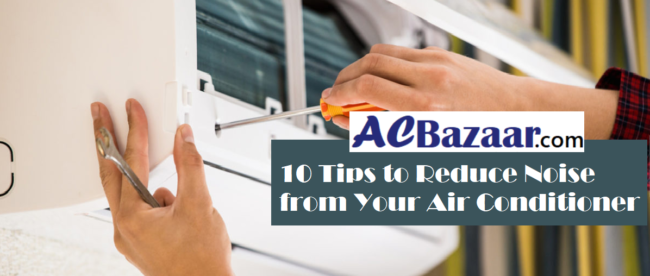10 Tips to Reduce Noise from Your Air Conditioner
10 Tips to Reduce Noise from Your Air Conditioner
Excessive noise from an air conditioner can be disruptive and cause discomfort in your living space. Fortunately, there are several practical solutions to reduce noise levels and enjoy a quieter indoor environment. This article presents effective tips to help you minimize noise from your air conditioner.
- Regular Maintenance – Proper maintenance is essential for noise reduction. Schedule regular maintenance appointments with a professional to ensure that all components of your air conditioner are in good working condition. This includes lubricating moving parts, tightening loose connections, and addressing any issues that may contribute to excessive noise.
- Insulate Your Unit – Adding insulation around your air conditioner can help absorb and reduce noise transmission. Use soundproofing materials such as acoustic foam or mass-loaded vinyl to create a barrier between the unit and the surrounding area. Be sure to follow the manufacturer’s guidelines and consider seeking professional assistance for insulation installation.
- Install a Sound Barrier – Consider installing a sound barrier around the outdoor unit to minimize noise propagation. This can be achieved by constructing a fence or enclosure using materials designed for noise reduction, such as dense wood panels or acoustic barriers. Ensure proper airflow and ventilation while maintaining a suitable distance from the unit.
- Use Vibration Pads or Mounts – Air conditioners can produce vibrations that contribute to noise. Place vibration pads or mounts under the unit to absorb and dampen these vibrations. This helps prevent the transmission of vibrations to the surrounding structure, reducing noise levels.
- Check for Loose Components – Inspect your air conditioner for loose or rattling components. These can include screws, bolts, or panels that may have become loose over time. Tighten any loose components to eliminate unnecessary vibrations and noise.
- Install Soundproof Curtains or Window Treatments – If the noise is entering your home through windows, consider installing soundproof curtains or window treatments. These specialized curtains are designed to block external noise and provide sound insulation. They can be an effective solution for reducing noise from outside air conditioner units.
- Create a Buffer Zone – Create a buffer zone between the air conditioner and your living space by using furniture, plants, or bookshelves. These objects help absorb and deflect sound waves, reducing noise transmission and making your living space quieter.
- Location Matters – During installation or relocation, consider the placement of your air conditioner. Avoid positioning it near bedrooms, living areas, or areas where noise sensitivity is high. Opt for a location that minimizes noise disturbance while allowing proper airflow and accessibility for maintenance.
- Upgrade to a Quieter Model – If your current air conditioner is old and noisy, consider upgrading to a newer, quieter model. Look for air conditioners with lower decibel ratings specifically designed for quiet operation. Energy-efficient models often incorporate noise-reducing features, providing both comfort and noise reduction benefits.
- Consult an HVAC Professional – If excessive noise persists despite your efforts, it is advisable to consult an HVAC professional. They can assess your air conditioner, identify any underlying issues causing the noise, and recommend appropriate solutions tailored to your specific situation.
Reducing noise from your air conditioner is possible by implementing these practical tips. Regular maintenance, insulation, sound barriers, vibration pads, and strategic placement can significantly minimize noise levels. Additionally, upgrading to a quieter model or seeking professional assistance can help resolve persistent noise issues. By taking these steps, you can create a quieter and more comfortable indoor environment.




Leave a comment